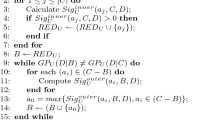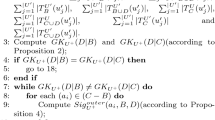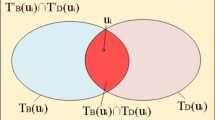Abstract
Rough set theory is emerging as a powerful toll for reasoning about data, attribute reduction is one of the important topics in the research on the rough set theory. At present, there are few researchers investigate attribute reduction based on incomplete decision table. Since computing attribute reduction of the incomplete decision table is more difficult than that of complete decision table. Now, some researchers used the assignment matrix method to design an attribute reduction algorithm based on the incomplete decision table. The time complexity of this algorithm is O(|C|3|U|2). In this algorithm, the key computation was computing the assignment matrix of the subset of condition attribute set B ⊆ C(denote MB). In the old algorithm, the time complexity for computing assignment matrix MB is O(|B||U|2). However, to lower the time complexity, we first provide an efficient algorithm for computing MB. The time complexity of the new algorithm is O(|U|2). To further improve the efficiency of attribute reduction algorithm, we reduce the unnecessary and repetitive computation of the old algorithm. Then we use the above algorithm to design an efficient algorithm of attribute reduction based on assignment matrix. The time complexity of the new algorithm is O(|C|2|U|2). At last, we use an example to illustrate the efficiency of the new algorithm.
Access this chapter
Tax calculation will be finalised at checkout
Purchases are for personal use only
Preview
Unable to display preview. Download preview PDF.
Similar content being viewed by others
References
Pawlak, Z.: Rough sets. International Journal of Computer and Information Science 11, 341–356 (1982)
Pawlak, Z.: Rough sets theoretical aspects of reasoning about data, pp. 9–30. Kluwer Academic Publishers, Dordrecht (1991)
Pawlak, Z.: Rough set theory and its application to data analysis. Cybernetics and Systems 29, 661–668 (1998)
Hu, X.H.: Mining knowledge rules from databases-a rough set approach. In: Proceedings of IEEE International Conference on Data Engineering, pp. 96–105. IEEE Computer Society Press, Los Alamitos (1996)
Kryszkiewicz, M.: Rough set approach to incomplete information systems. Information Sciences 112, 39–49 (1998)
Kryszkiewicz, M.: Rule in incomplete information systems. Information Sciences 113, 271–292 (1999)
Stefanowski, J., Tsoukias, A.: Incomplete information tables and rough classification. Computational Intelligence 17, 545–566 (2001)
Wang, G.Y.: Extension of rough set under incomplete information systems. Journal of Compute Research and Development 39, 1238–1243 (2002) (in Chinese)
Tzung-Pei, H.: Learning rules from incomplete training examples by rough sets. Expert Systems with Application 22, 285–293 (2002)
Leung, Y., Li, D.Y.: Maximal consistent block technique for rule acquisition in incomplete information systems. Information Sciences 153, 85–106 (2003)
Wu, W.Z., Mi, J.S., Zhang, W.X.: A new rough set approach to knowledge discovery in incomplete information systems. In: ICMLC, pp. 1713–1718 (2003)
Lenng, Y., Wu, W.Z., Zhang, W.X.: Knowledge acquisition in incomplete information systems: a rough set approach. European Journal of Operational Research 168, 164–180 (2006)
Liang, J.Y., Shi, Z.Z., Li, D.Y.: The information entropy, rough entropy and knowledge granulation in incomplete information systems. International Journal of General Systems 35, 641–654 (2006)
Liang, J.Y., Xu, Z.B.: An algorithm for knowledge in incomplete information systems. International Journal of Uncertainty, Fuziness and Knowledge-based Systems 10, 95–103 (2002)
Li, X.H., Shi, K.Q.: A knowledge granulation-based algorithm for attribute reduction under incomplete information systems. Computer Science 33, 169–171 (2006) (in Chinese)
Zhou, X.Z., Huang, B.: Rough set-based attribute reduction under incomplete Information Systems. Journal of Nanjing University of Science and Technology 27, 630–636 (2003) (in Chinese)
Huang, B., He, X., Zhou, X.Z.: Rough Computational methods based on tolarence matrix. Acta Automatica Sinica 30, 363–370 (2004) (in Chinese)
Huang, B., Li, H.X., Zhou, X.Z.: Attribute Reduction Based on Information Quantity under Incomplete Information Systems. Systems Application Theory and Practice 34, 55–60 (2005) (in Chinese)
Qian, Y.H., Liang, J.Y.: Positive approximation and rule extracting in incomplete information systems. International Journal of Computer Science and Knowledge Engineering 2, 67–80 (2008)
Gao, S.Y., Tao, Z.: Using Assignment Matrix on Incomplete Information Systems Reduction of Attributes. In: ICFIE. ASC, vol. 40, pp. 75–82 (2007)
Yang, B.R., Xu, Z.Y., Song, W.: An Efficient Algorithm for Computing Core Based on Positive Region. In: ICAI 2007, Las Vegas, Nevada, USA, pp. 124–132 (2007)
Author information
Authors and Affiliations
Editor information
Editors and Affiliations
Rights and permissions
Copyright information
© 2009 Springer-Verlag Berlin Heidelberg
About this paper
Cite this paper
Xu, Zy., Yang, B., Shu, Wh., Yang, Br. (2009). Efficient Algorithm for Attribute Reduction of Incomplete Information Systems Based on Assignment Matrix. In: Cao, B., Li, TF., Zhang, CY. (eds) Fuzzy Information and Engineering Volume 2. Advances in Intelligent and Soft Computing, vol 62. Springer, Berlin, Heidelberg. https://doi.org/10.1007/978-3-642-03664-4_86
Download citation
DOI: https://doi.org/10.1007/978-3-642-03664-4_86
Publisher Name: Springer, Berlin, Heidelberg
Print ISBN: 978-3-642-03663-7
Online ISBN: 978-3-642-03664-4
eBook Packages: EngineeringEngineering (R0)




